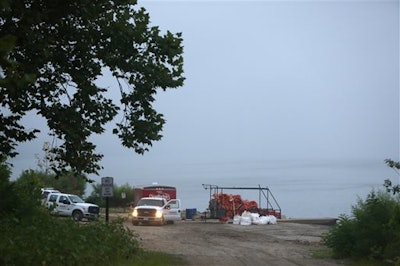
CINCINNATI (AP) — An estimated 5,000 to 8,000 gallons of fuel oil spilled into the Ohio River, leading authorities to shut off water intake valves for both the Ohio and Kentucky sides of the waterway to protect water supplies, and a 15-mile section of the river was closed to allow cleanup.
The spill from a Duke Energy power plant in New Richmond, about 20 miles southeast of Cincinnati, happened around 11:15 p.m. Monday, said Duke spokeswoman Sally Thelen. She said the spill at the W.C. Beckjord Station occurred during a routine transfer of fuel oil from a larger tank to smaller ones and was stopped within about 15 minutes.
Coast Guard Lt. Katherine Cameron says the spill is considered medium-sized, a designation that applies to inland leaks between 1,000 and 10,000 gallons of oil.
"We are working with officials from Duke Energy to determine the extent," Cameron said.
The section was closed to all river traffic, including barges carrying commercial goods, when the spill was reported. Tim Smith, chief of investigations for the Coast Guard's Ohio Valley sector, said his agency hoped to reopen the section as soon as possible.
Local, state and environmental agencies also were at the scene Tuesday, and the Coast Guard said Duke has assumed responsibility for spill cleanup.
Ohio EPA spokeswoman Heidi Griesmer said the water quality alert system for the Ohio River was activated and all river drinking water intakes in Ohio were sealed off. The Greater Cincinnati Water Works shut down its water intakes around 12:50 a.m. and monitoring of the water entering the system prior to shut-down showed no contamination, Griesmer said.
The spill comes just weeks after about 400,000 people in Toledo were left without clean tap water when toxins produced by Lake Erie algae got into the city's water supply
Water quality scientists from the Greater Cincinnati Water Works continued monitoring the river in conjunction with the Northern Kentucky Water District. Rocky Merz, a spokesman for the city of Cincinnati, said no threats to drinking water have been found.
Merz said a strong odor of oil reported along the river early Tuesday morning seemed to dissipate as the day progressed.



















